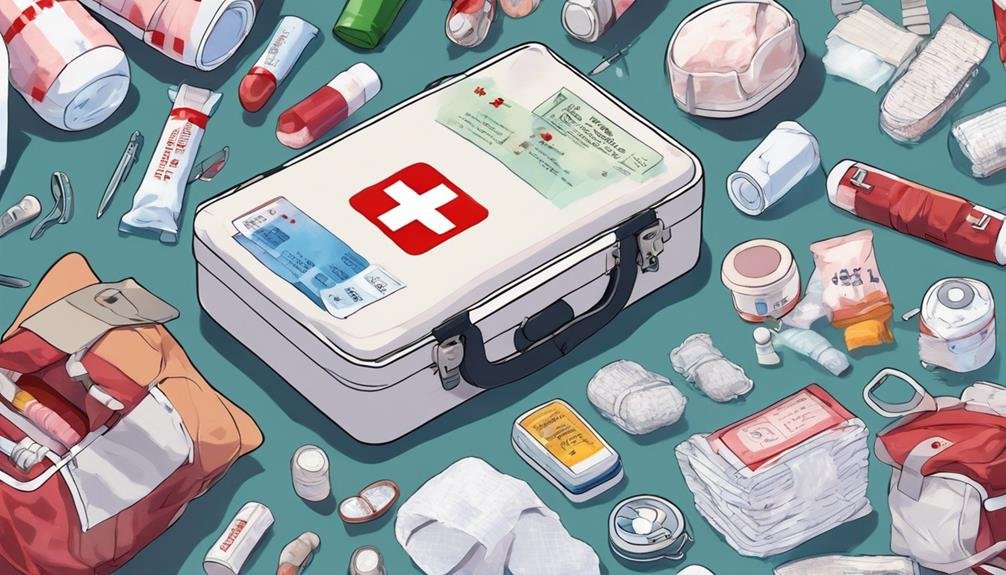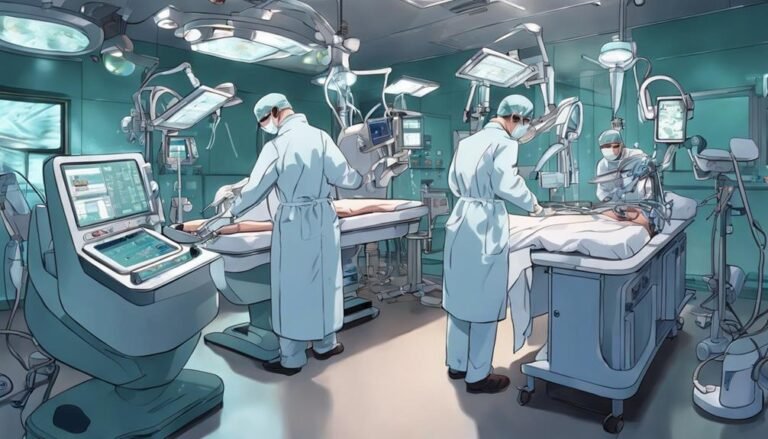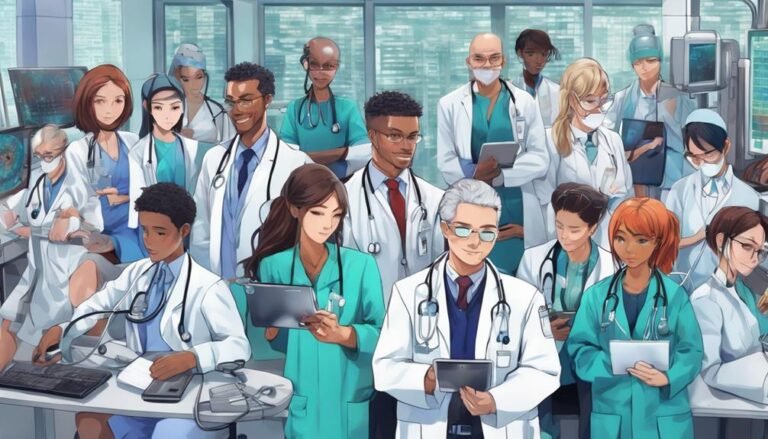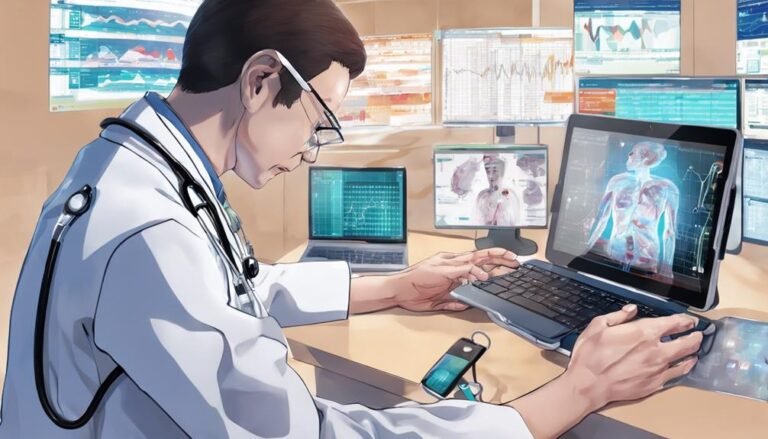How to Be More Prepared for Healthcare Emergencies
You may not be aware that a significant number of people are unprepared for healthcare emergencies when they strike. Knowing how to handle such situations can make a vital difference in the outcome for you or your loved ones.
By taking simple steps to enhance your preparedness, you can be more equipped to handle unexpected health crises with confidence. From basic first aid skills to having a well-stocked emergency kit, there are various strategies you can implement to make sure you are ready when the unexpected occurs.
Key Takeaways
- Master first aid skills for immediate care.
- Build a comprehensive emergency kit with essentials.
- Understand insurance policies for cost-effective healthcare.
- Create a detailed medical information sheet for emergencies.
Importance of Preparedness
Being prepared for healthcare emergencies is essential for ensuring the safety and well-being of yourself and those around you. Emergency preparedness provides peace of mind, knowing that you have taken proactive healthcare steps to protect yourself and others. By having safety measures in place, you can respond effectively in case of unexpected medical situations, reducing the risk of further complications.
Creating an emergency plan tailored to your specific needs and circumstances is a critical aspect of preparedness. This plan should include important contact information, medical history, and any necessary medications. Regularly reviewing and updating this plan is also vital to guarantee its relevance and effectiveness.
In addition to having a well-thought-out emergency plan, being familiar with local healthcare resources and facilities can be beneficial during emergencies. Knowing where to go and who to contact can save valuable time and potentially save lives. Stay informed about basic healthcare procedures and stay prepared for any unforeseen healthcare events that may arise.
Basic First Aid Skills
Knowing essential first aid techniques can be vital in emergency situations. Quick and proper immediate care procedures can make a significant difference in outcomes.
Understanding common injury treatments is key to providing effective assistance when needed.
Essential First Aid Techniques
In handling healthcare emergencies effectively, mastering basic first aid skills is essential. When providing first aid, understanding bandage application and CPR techniques can make a significant difference. Proper wound care and splinting methods are also crucial aspects to be aware of. Below is a simple table summarizing these essential first aid techniques:
| First Aid Technique | Description | Importance |
|---|---|---|
| Bandage Application | Learn to apply bandages correctly to control bleeding and protect wounds. | Vital for preventing infections and further injury. |
| CPR Techniques | Understand the basics of CPR to assist in reviving someone in cardiac arrest. | Can save a life in critical situations. |
| Wound Care | Properly clean and dress wounds to prevent infections and promote healing. | Essential for preventing complications. |
Mastering these techniques can empower you to provide effective help in various healthcare emergencies.
Immediate Care Procedures
To provide immediate care in healthcare emergencies, mastering basic first aid skills is essential. When faced with a medical crisis, knowing how to respond promptly can make a significant difference. Here are some important immediate care techniques and emergency response strategies:
- Performing CPR: Learn how to administer cardiopulmonary resuscitation to someone in cardiac arrest.
- Managing Bleeding: Understand how to apply pressure, elevate the wound, and use bandages to control bleeding.
- Handling Choking: Be prepared to perform the Heimlich maneuver on someone who's choking.
- Evaluating Essential Signs: Regularly check the person's pulse, breathing, and level of consciousness to monitor their condition.
Common Injury Treatments
During healthcare emergencies, it is essential to be proficient in administering basic first aid treatments for common injuries. Effective injury prevention strategies can reduce the risk of accidents. In case of injuries, knowing recovery techniques and pain management methods is crucial. Here is a table summarizing common injury treatments:
| Common Injury | Treatment | Recovery Strategy |
|---|---|---|
| Cuts | Clean with soap | Apply bandage |
| Sprains | Rest and ice packs | Gentle exercises |
| Burns | Cool water and aloe | Keep area clean and dry |
Rehabilitation techniques play a vital role in restoring function after an injury. Remember, being prepared and knowledgeable can make a significant difference in handling healthcare emergencies effectively.
Building an Emergency Kit
Prepare a well-stocked emergency kit to guarantee you have essential supplies readily available in case of a healthcare emergency. Here's a quick checklist to help you assemble your kit:
- First Aid Supplies: Include bandages, antiseptic wipes, gauze, adhesive tape, and scissors to address minor injuries promptly.
- Medications: Keep a supply of essential medications like pain relievers, antihistamines, and any prescription medications you or your family members may need.
- Emergency Blanket: A compact emergency blanket can provide warmth and comfort in case of an unexpected situation where you might need to wait for help.
- Flashlight and Batteries: In emergencies, having a reliable light source can be critical. Make sure your flashlight works and pack extra batteries to avoid being left in the dark.
Knowing Emergency Contacts
When it comes to healthcare emergencies, knowing your family emergency contacts and medical provider contacts is important. These contacts are the ones you can rely on for support and essential information during challenging times.
Take a moment to confirm that you have these numbers readily available in case of an emergency.
Family Emergency Contacts
In times of healthcare emergencies, knowing your family emergency contacts is crucial for swift and effective response. Here are four key points to keep in mind:
- Emergency Communication: Make sure all family members are aware of how to communicate in case of an emergency.
- Family Support: Confirm that your emergency contacts are informed about any specific medical conditions or allergies.
- Contact Details: Maintain updated contact information for each family member's emergency contact.
- Emergency Procedures: Familiarize yourself and your family with emergency procedures and protocols to follow during a healthcare crisis.
Having these details readily available can make a significant difference in obtaining the help and support you need promptly.
Medical Provider Contacts
Make sure you have readily accessible contact information for all your medical providers in case of emergencies to expedite necessary assistance. In times of crisis, having quick access to your medical provider contacts can be essential for effective communication and coordination of care.
Confirm you have a list that includes the names, phone numbers, and specialties of your primary care physician, specialists, therapists, and any other healthcare professionals you regularly see. This information can help emergency responders and hospital staff understand your medical history and current treatment plans promptly.
Establishing clear emergency protocols and communication strategies with your medical providers can enhance the efficiency of care during unexpected healthcare situations.
Understanding Health Insurance Coverage
Understanding your health insurance coverage is essential for managing your healthcare costs and accessing necessary medical services. Here are four key points to help you navigate your health insurance effectively:
- Know Your Network:
Understand which healthcare providers are in-network and out-of-network. Visiting in-network providers can save you money as they've negotiated rates with your insurance company.
- Review Your Policy:
Take the time to go through your insurance policy document. Pay attention to details like deductibles, copayments, and coverage limits to avoid unexpected expenses.
- Utilize Preventive Services:
Many insurance plans cover preventive services like vaccinations and screenings at no cost. Prioritize preventive care to maintain good health and catch any issues early.
- Ask Questions:
If you're unsure about coverage or a medical bill, don't hesitate to reach out to your insurance provider. Clarifying doubts early can prevent surprises later on.
Creating a Medical Information Sheet
When preparing for healthcare emergencies, it's important to have a medical information sheet ready.
This sheet should include essential medical details, emergency contact information, as well as any allergies and existing health conditions you have.
Having this information readily available can help medical professionals provide you with the best care in times of need.
Vital Medical Details
To guarantee prompt and efficient healthcare delivery during emergencies, compiling a thorough medical information sheet is essential. Here are some key items to include in your medical information sheet:
- Medical History: Detail any chronic conditions, past surgeries, allergies, and current medications.
- Emergency Protocols: Provide specific instructions for emergency situations related to your health conditions.
- Blood Type and Medical Conditions: Include your blood type and any critical medical conditions that first responders should be aware of.
- Insurance Information: List your insurance provider, policy number, and any relevant contact information.
Having this crucial medical information readily available can greatly assist healthcare professionals in providing you with the best care during emergencies.
Emergency Contact Information
In creating a medical information sheet, make sure your emergency contact information is clearly listed for immediate access during critical situations. Include names, phone numbers, and relationships to guarantee a swift emergency response. This contact list should be easily identifiable on your medical information sheet.
During emergencies, healthcare providers need to quickly reach out to your loved ones for important updates or decisions. Assure that this information is up to date and accurate. Having a well-organized emergency contact list can make a significant difference in how efficiently medical professionals can communicate with your family or friends.
Take the time to review and update this list regularly to guarantee it remains current and effective in times of need.
Allergies and Conditions
Guarantee your medical information sheet includes detailed information about any allergies and medical conditions you have for prompt and effective care during emergencies. When listing your allergies and conditions, make sure you cover the following important points:
- Food Allergies: Clearly state any food allergies you have, specifying the type of reaction you experience.
- Respiratory Conditions: Include details of any respiratory conditions such as asthma or COPD, along with your prescribed medications.
- Skin Allergies: Mention any skin allergies you have, like reactions to certain medications or materials.
- Chronic Illnesses: Provide information about chronic illnesses like diabetes or heart conditions, including treatment plans and emergency protocols.
Having this information readily available can greatly aid healthcare providers in delivering appropriate care during emergencies.
Seeking Advanced Training
Consider enrolling in specialized courses to enhance your knowledge and skills in healthcare emergency preparedness. Advanced training can provide you with specialized skills that are vital in handling healthcare emergencies effectively. Courses such as Advanced Cardiac Life Support (ACLS), Pediatric Advanced Life Support (PALS), or Trauma Nursing Core Course (TNCC) can equip you with the necessary tools to respond confidently in critical situations.
These specialized courses explore deeper into specific aspects of emergency care, ensuring you're well-prepared to handle a wide range of healthcare emergencies. By participating in advanced training, you can learn advanced techniques, protocols, and best practices that can make a significant difference in patient outcomes during emergencies.
Additionally, advanced training not only enhances your skills but also boosts your confidence in high-pressure situations. It allows you to stay calm and focused, providing better care to those in need. Investing in specialized courses demonstrates your commitment to being prepared for any healthcare emergency that may arise.
Staying Informed on Health Risks
Guarantee you stay informed on health risks by regularly updating your knowledge and awareness of potential threats in your environment. It's essential to prioritize staying informed to protect yourself and your loved ones. Here are some tips to help you stay on top of health risks:
- Stay Updated: Keep yourself informed about current health risks by following reputable sources such as the CDC or WHO.
- Risk Assessment: Understand how to assess the health risks in your surroundings and take necessary precautions.
- Prevention Strategies: Implement preventive measures based on the identified risks to minimize potential health threats.
- Health Education and Awareness Campaigns: Participate in health education programs and awareness campaigns to stay informed about emerging health risks and how to address them effectively.
Practicing Emergency Scenarios
To prepare effectively for healthcare emergencies, it is important to practice emergency scenarios regularly. Role playing exercises and emergency response drills can help you and your healthcare team be better prepared for unexpected situations. By simulating various emergencies, you can identify areas that need improvement, refine communication strategies, and enhance your overall response guarantee.
Consider incorporating the following types of emergency scenarios into your practice sessions:
| Scenario | Objective |
|---|---|
| Patient Collapse | Test response time and CPR proficiency |
| Medication Error | Evaluate decision-making under pressure |
| Natural Disaster | Practice evacuation and triage protocols |
Role playing exercises can help healthcare professionals understand their specific roles and responsibilities during crises, while emergency response drills allow for a hands-on application of emergency protocols. Regular practice will not only increase confidence but also ensure a more coordinated and effective response when a real healthcare emergency occurs.
Reviewing and Updating Plans
Make sure that your healthcare emergency plans are regularly reviewed and updated to maintain their effectiveness in responding to unexpected situations. It's essential to stay prepared for any unforeseen events by ensuring that your plans are up to date. Here are some important steps to take into account:
- Regular Plan Updates: Schedule periodic reviews of your healthcare emergency plans to incorporate any new information or procedures.
- Conduct Emergency Drills: Practice different emergency scenarios with your team to make certain everyone knows their roles and responsibilities.
- Preparedness Checklist: Develop a checklist to verify that all necessary supplies and resources are readily available in case of an emergency.
- Communication Strategies: Establish clear communication protocols to ensure effective coordination among staff members during a crisis.
Conclusion
In the unpredictable domain of healthcare emergencies, being prepared is like having a life-saving beacon in a stormy sea.
By mastering basic first aid skills, assembling an emergency kit, and staying informed, you're equipping yourself with the tools to navigate through any crisis.
Remember, a little preparation now can make a world of difference when the unexpected strikes.
Stay ready, stay safe, and stay empowered in the face of uncertainty.







